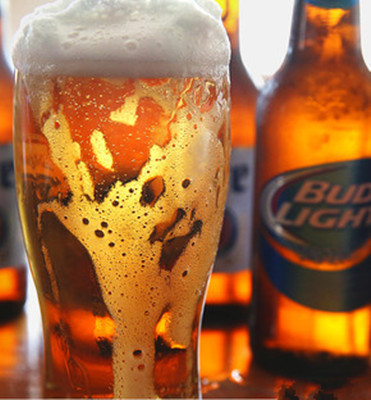啤酒企業的兼并
Foamy war
彌漫著泡沫的戰爭
SABMiller may be swallowed up by its main rival, AB InBev
南非米勒也許會被其主要競爭對手—百威英博吞并
THE world's biggest brewer, AB InBev, is also the most frugal. There are no company cars for senior executives. Carlos Brito, the boss, flies economy class. That is one reason why, with 18 of global beer sales, ABI has a third of the profits.
英博,全球最大的啤酒制造商,同時也是最節儉的一個。英博旗下的高管都沒有公司配車。老板Carlos Brito平時出行都乘坐經濟艙。之所以英博的啤酒銷售額占全球的18,利潤額卻高達全球的三分之一,這就是原因之一。

This will matter in the wary manoeuvres now taking place among the giants of global brewing. On September 14th Heineken, the number three by volume, said it had rejected a takeover proposal from SABMiller, the number two. SAB seems to have been trying to defend itself against a possible takeover by ABI, which was said to be talking to bankers about raising 75 billion to buy its rival. That was little more than a rumour, but industry-watchers suspect something big is indeed brewing, in brewing. And the chances are that ever-thirsty ABI, maker of Budweiser and StellaArtois, will swallow SAB.
對于正施行謹慎策略的全球啤酒釀造業巨頭,這點至關重要。9月14日,銷量排行第三的喜力啤酒稱其已拒絕了來自銷量第二的南非米勒的一個收購案。南非米勒似乎一直在抵御被英博收購的可能,據說英博目前正與銀行家們討論提高750億歐元以收購其競爭對手。這只是個謠言,但是業內觀察人士猜測釀造業內正醞釀著大事件。百威啤酒與時代啤酒的制造商—一如既往十分饑渴的英博公司將有機會吞并南非米勒。
The beer behemoth has few other ways to grow. In rich countries, consumption of beer has stopped rising. In America, ABI's Anheuser-Busch division is suffering growing competition from small makers of “craft beer”. The number of American breweries has jumped from fewer than 100 in 1983 to more than 3,000 today. ABI has its roots in Brazil, but there drinkers are suffering from a sluggish economy and post-World Cup blues. This leaves ABI with two options, says Andrew Holland, an analyst at Societe Generale: give its cash back to shareholders or buy something.
啤酒業巨頭已無其他發展之路。在富裕國家,啤酒的消費量已止步不前。在美國,英博的Anheuser-Busch部門正面臨著來著生產“精釀啤酒”的小型制造商日益激烈的競爭。美國啤酒廠的數量已從1983年的不到100家跳躍式增長到如今的3000多家。英博起源于巴西,但那里的啤酒消費者正遭受著經濟疲軟與世界杯后的蕭條。Societe Generale的分析師Andrew Holland說:這使得英博有兩個選擇,要么把現金還給股東,要么買些什么。
SAB is a tempting target. Though based inLondon, its origins are inSouth Africa; it has breweries and bottling plants in 15 African countries, where people still mainly guzzle moonshine. It has stakes in 21 others through an alliance with Castel, a French drinks company. Nearly 70 of SAB's sales are in emerging markets, many of which are still developing a taste for beer. Last year its sales by volume expanded by 3. ABI's, in contrast, dropped 2.
南非米勒是個令人心動的目標。盡管總部在倫敦,但其起源于南非;其在15個非洲國家都擁有釀酒廠和裝瓶工廠,這些國家的人們仍主要狂飲著私釀的威士忌。南非米勒通過與法國飲料公司Castel聯盟,在其它21家公司也擁有股份。南非米勒近70的銷售額來自新興市場,其中許多地區的人們還正在逐漸養成飲用啤酒的嗜好。去年其啤酒銷售量增長了3。相反,英博的銷售量縮減了2。
If ABI gets hold of SAB it will no doubt try to repeat tricks that have worked well since AmBev of Brazil merged with Interbrew of Belgium a decade ago and then pushed out its American boss: squeeze costs and use the new acquisition as a platform to spread its brands. That was the formula after the merged group bought Anheuser-Busch, the maker of Budweiser, in 2008. Grupo Modelo, a Mexican brewer which makesCoronaand has been part of ABI since last year, is now undergoing the same rigours.
十年前,巴西AmBev啤酒集團并購了比利時Interbrew啤酒集團,而后解聘了其美國老板:壓縮成本,并使用新收購的公司作為其傳播品牌的平臺。如果英博吞并了南非米勒,其無疑會試著故伎重演。自從合并后的集團收購了百威的制造商安海斯- 布希公司之后,這就成了定式。Corona的制造商—墨西哥啤酒集團Modelo去年也成為了英博的一部分,其如今正處于相同的窘境之中。
SAB would be a more difficult undertaking. For one thing, notes Mr Holland, it is more tightly managed than “fat and lazy” Anheuser-Busch was, so there is less scope for cutting costs. SAB is bigger and more complex than anything else ABI has taken on. A knack for cost-cutting may not serve it as well in fast-growing markets. Another problem is that in some countries the two giants' combined businesses would be too big. In America Anheuser-Busch and SAB's joint venture with Molson Coors, another rival, would together have three-quarters of the beer market. InChinathe two would have more than a third. These are not insurmountable problems. InAmerica, for example, the stake in the joint venture could be sold to Molson Coors.
南非米勒將會是一個更加困難的任務。Holland先生指出,首先,比起過去臃腫懶惰的安海斯- 布希公司,南非米勒管理更為嚴格,因此壓低收購價格的范圍更小。比起英博收購的其他公司,南非米勒要更大更復雜。壓低收購價格的技巧對于快速增長型市場也許并不適用。另一個問題在于在有些國家,這兩家巨頭合并后的企業將過于龐大。在美國,安海斯- 布希公司以及南非米勒與 另一個競爭對手—莫爾森庫爾斯的合資企業共同占據著3/4的啤酒市場。在中國,這兩者的市場占有率超過1/3。但這些并不是無法克服的難題。例如在美國,南非米勒所持有的合資公司的股份可能會被出售給莫爾森庫爾斯公司。
Despite the obstacles, a merger of the leading two beer companies looks the likeliest of the potential huge deals. Heineken, which is controlled by the Heineken family even though it owns just 23 of the company's equity, has now given notice that it does not want to be bought. Carlsberg, the smallest of the big four, is controlled by a foundation. So the parsimonious Mr Brito may well get his hands on SAB if he wants it enough. Teaching Africans to like Budweiser, however, may prove somewhat harder.
盡管困難重重,這兩大啤酒公司的合并看起來是潛在的巨額交易中最有可能達成的。喜力集團,其掌控者為僅擁有23的公司股權的喜力家族,目前發布公告表示不愿意被收購。四大巨頭中最小的嘉士伯啤酒公司由一家基金會掌控。所以如果極度節儉的Brito先生真心想收購南非米勒,他很可能會得到它。然而,引導非洲人民喜愛上百威啤酒,也許就更有些難度了。












